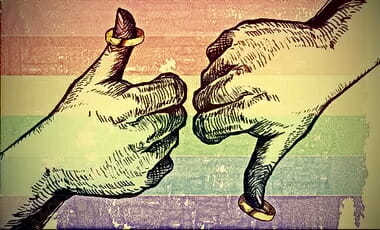In the Star Tribune, Katherine Kersten casts a gimlet eye on developments:
The marriage amendment may have fallen short at the polls in November, but a majority of Minnesotans continue to support marriage as the union of one man and one woman, according to recent polls by KSTP/SurveyUSA and the Star Tribune. In the Star Tribune poll, only 38 percent said they favored legalization of same-sex marriage.
Clearly, the amendment vote wasn’t a green light for same-sex marriage, and legislators would be wrong to see it that way. Most likely, voters were spooked by a lavishly funded campaign in which supporters of same-sex marriage warned that placing the current definition of marriage in our state Constitution would “end the conversation” about marriage.
Now, just months later, these advocates are mounting an aggressive campaign to do just that. They are pressuring the Legislature to pass SF925, a bill described as “the marriage between two persons authorization.”
More conversation? Who needs it? same-sex marriage supporters seem to say. The issue, they insist, is a no-brainer — a simple matter of “equality,” and the logical next step in the struggle against “discrimination.” The point is so obvious that anyone who questions their project must be a “bigot,” and so drummed out of hearing in polite society.
But a look at SF925 reveals that something much more insidious than advocates let on is underway. This bill would strip the words “mother” and “father” of meaning under Minnesota law. Henceforth, the bill states, these words — among the most beloved and culturally freighted in the English language — “must be construed in a neutral manner to refer to a person of either gender.”
Hmmm. Mothers are Fathers. Boys are Girls. Orwell! thou should’st be living at this hour.
Oh, I can’t wait for the day when we can say that every “boy” and “girl” deserves a “mother” and “father” construed in a neutral manner to refer to to a person of either gender, as required by Minnesota law.





